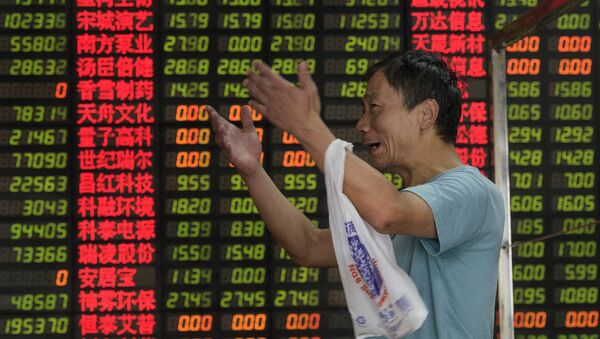Kristian Rouz — Mainland China's manufacturing is shrinking due to stalled factory-gate prices and corporate revenues falling dramatically as industrial exports generate less profits amidst falling cost-efficiency of Chinese labour. At the same time, US corporate earnings have fallen for two consecutive quarters and are forecast to drop in the third quarter as well due to the dollar's strength and cheap energy. A solution to the corporate underperformance in both nations would be the reigntion of growth in China, triggering a substantial increase in commodity prices, thus spurring US inflation. A quicker expansion in the US' core price index is key to the Fed's raise in borrowing costs, easing demand for the dollar and supporting the profitability of US companies' overseas operations.
The recent macro data from China and market projections in the US further support such claims.
The mainland's manufacturers reported on Monday their revenues falling the most in roughly four years due to the global overproduction in industrial goods and weak demand. The devalued renminbi has mostly failed to provide a sensible boost to Chinese exports, as China's main rivals in international trade like Vietnam responded with a similar move.
China's industrial profits dropped a massive 8.8% in August year-on-year, according to data published by the Bureau of National Statistics in Beijing. It is their greatest slump since at least 2011, when the government began to publish its figures.
The Chinese manufacturing benchmark index dropped to a three-year low due to the severe underinvestment hindering the modernization of production capacities. Currently, operational expenses of Chinese companies are high as labour has appreciated as well, while productivity is still low. Manufactured goods are lacking competitiveness, resulting in factory gate deflation, while high interest rates impose limits on domestic investment.
In the US, investors are buying mostly bonds and domestic-driven stocks, while companies exposed to growth figures, like in the construction business, or international headwinds, like most multinationals, are poised to underperform.
No wonder most US-based multinational businesses are interested in mainland China rebounding from its current financial and economic struggle. Meanwhile, Beijing is slowly making progress on liberalizing and deregulating its financial market. The US might indeed want to provide some political support to China's reserve currency bid in the IMF and take other measures to boost Beijing's international financial credibility, however, the intensified US-Chinese rapprochement might take longer given certain political obstacles.



